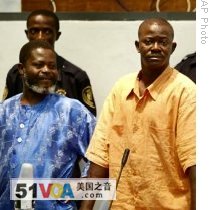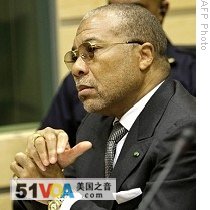Dakar
08 April 2009
Sierra Leone's war crimes tribunal has sentenced three former rebel chiefs to long prison terms for crimes against humanity.
 |
| Sierre Leone rebel commanders Augustine Gbao, left, and Issa Hassan Sesay as they appear in court at the U.N. backed Special Court for Sierra Leone in Freetown, Sierra Leone (File) |
That is the longest sentence handed down by the special court, which was established by the United Nations and the Sierra Leone government. The court can not impose the death penalty or a life sentence.
Former RUF commander Morris Kallon will serve a maximum of 39 years. Commander Augustine Gbao will spend 25 years in prison.
The three most-senior surviving members of the RUF were found guilty of murder, rape, sexual enslavement, attacks against U.N. troops and the use of child soldiers.
Kallon's lawyer, Charles Taku, denounced his client's sentencing.
"This is a travesty of justice," said Taku. "And I can also say that it is a complete mockery of international criminal justice."
Corinne Dufka, who directs West Africa operations for the U.S.-based group, Human Rights Watch, says the three men orchestrated the violence that left tens of thousands of people maimed as rebels cut off victims' arms, legs, noses and ears.
"They commanded troops that roamed the towns and villages and the Sierra Leonean countryside, committing some of the most unspeakable and horrific atrocities - from their signature atrocity of amputation to horrific sexual violence against girls and women," she said.
All three men were found guilty of so-called "forced marriage" - the first time that sexual assault verdict has been handed down by an international tribunal.
Alhaji Jusu Jarkah heads a group of Sierra Leonean amputees and war wounded.
"We are very much happy as victims," he said. "We see that the law has taken its course."
These are the eighth and last sentences by the Freetown session of the special court. Corinne Dufka of Human Rights Watch says it puts on notice current-day perpetrators of war crimes in Africa and around the world that no one is above the law.
"In Sierra Leone, the eight people who have been convicted were really considered untouchable," added Dufka. "That was a very profound, well-ingrained perception among Sierra Leoneans that the big men simply got away with murder, mutilation, rape, massacres and other crimes. So I think that precedent has begun to be broken."
Dufka lived more than three years in Freetown during the civil war. She says the Special Court's work could have a profound impact on Sierra Leone's political future.
"I think the true test of whether the Special Court has had an effect will be the extent to which Sierra Leoneans today begin to hold their leaders and others accountable for different types of crimes," said Dufka, "primarily the bad governance and corruption, which, in fact, gave rise to Sierra Leone's brutal armed conflict in the first place."
 |
| Former Liberian President Charles Taylor sits in courtroom prior to hearing of witnesses in trial in The Hague, 08 Jan 2008 |
His trial was moved to The Hague because of fears that his supporters might disrupt proceedings in neighboring Sierra Leone.
Mr.
Taylor's attorneys opened their defense this week by asking judges to
acquit the former rebel leader because they say prosecutors have failed
to prove their case against him. Prosecutors are expected to respond
to the defense motion on Thursday.
If the motion is denied and the trial continues, Mr. Taylor's lawyers say he will be their first witness.
Sierra Leone's war crimes tribunal has sentenced three former rebel
chiefs to long prison terms for crimes against humanity.